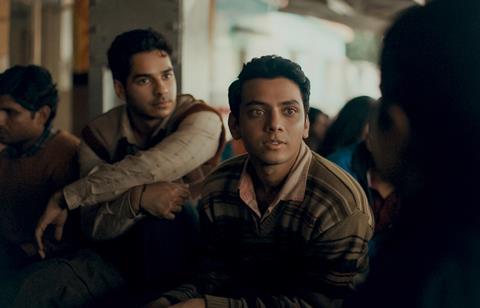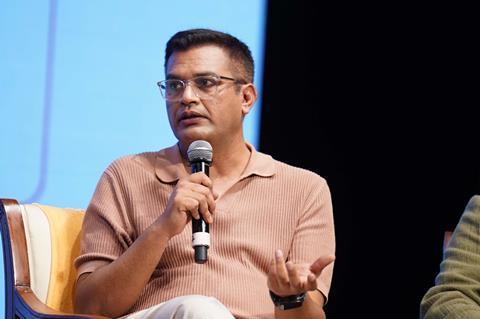
In 2015, Indian writer/director Neeraj Ghaywan’s debut feature Masaan premiered in Un Certain Regard at Cannes and went on to win the Fipresci award and the prix avenir prometteur. A decade later, he is back in the festival section with his second feature Homebound.
Ghaywan attributes the lengthy gap between the two films to Cannes and his own imposter syndrome. “I think every filmmaker goes through self-doubt,” he says. “In my case it got accentuated at Cannes, it got triggered during the applause that I got [for Masaan]. Since then, it’s as though I’ve been trying to find meaning in a meaningless world. This film has been a quest to find that connection, that meaning.”
In the interregnum, Ghaywan made an acclaimed short film, Juice, directed several episodes of the popular Netflix series Sacred Games and Amazon Prime Video’s Made In Heaven, and directed the ‘Geeli Pucchi’ segment of Netflix anthology film Ajeeb Daastaans.
A story about the deep bonds of friendship and the struggle for survival of the disempowered in rural north India, Homebound marks the second partnership of Ghaywan (after ‘Geeli Pucchi’) with Dharma Productions, one of India’s leading mainstream film production and distribution companies headed by director/writer/producer Karan Johar, the name behind Bollywood blockbusters My Name Is Khan, Kabhi Khushi Kabhie Gham and Brahmastra: Part One – Shiva.
Other Homebound producers include Adar Poonawalla, Apoorva Mehta and Somen Mishra, with co-producers Marijke de Souza and Melita Toscan du Plantier. Paradise City Sales is handling international sales.
“The world of Homebound might be far removed from the kind of commercial cinema I have directed or produced. But the emotions are universal,” says Johar. “This is the film that is going to take our [Indian] cinema forward in the globe.”
Johar has been to Cannes several times for red carpet appearances and brand commitments, and was one of four directors on the anthology film Bombay Talkies which played as a tribute screening to Indian cinema in Cannes 2013. Homebound marks his first trip to Cannes as a producer. “We are a mainstream Indian studio that has an officially selected film competing in Cannes, which is no mean achievement for us,” he says.
Further validation has come in the form of Martin Scorsese boarding Homebound as executive producer, a first for the US filmmaker on an Indian feature production after supporting the restoration of local classics including Uday Shankar’s 1948 Kalpana with Shivendra Singh Dungarpur’s Film Heritage Foundation.
Du Plantier, who was also a producer on Masaan, is said to have been crucial in getting Scorsese on board; as well as a producer, she is a driving force behind the Marrakech International Film Festival, which Scorsese has visited multiple times over the years including serving on the 2013 jury.
“She’s entirely the reason for Scorsese being a part of our film, and both Neeraj and I are eternally grateful to her for making this happen,” says Johar.

Zooms with Marty
According to Ghaywan, Scorsese’s involvement with Homebound has been in place for more than a year, but only three or four people on the crew knew about it. They used a code name on set: “bade papa” (elder patriarch).
“His validation is enormous for us,” says Johar, who first met Scorsese in 2010 in Berlin when the director and his Shutter Island star Leonardo DiCaprio came to meet Indian superstar Shah Rukh Khan, whose My Name Is Khan was also premiering at the festival.
Ghaywan had the opportunity to chat on Zoom and exchange notes with Scorsese during Homebound’s production. The Oscar-winning director read three drafts of the script, giving elaborate notes each time, and watched three cuts of the film.
“It was surreal to be on a Zoom call with him,” says Ghaywan. “He’d ask me to send the continuity sheet. We’d talk and discuss. There were moments where I would tell him that I appreciated his point, but wanted to keep something the way it was because of certain necessities of culture. He’d listen patiently.
“It’s for plain love for cinema,” adds Ghaywan. “I don’t know if I’d ever be so benevolent and kind.”
Stars in the making
The film has a set of young, new-generation Bollywood stars in the lead roles: Ishaan Khatter, Vishal Jethwa and Janhvi Kapoor. Ghaywan is looking forward to the world seeing them in a different light. “They surrendered 100 percent to their characters and the film, brought a sense of empathy to their roles,” he says.
While Masaan was shot in Varanasi in Uttar Pradesh, for Homebound Ghaywan pitched his tent in Bhopal, the capital of Madhya Pradesh. But like Masaan, Homebound – which was inspired by a July 2020 New York Times Opinions piece by Basharat Peer titled ‘A friendship, a pandemic and a death beside the highway’ – also tells the story of the subaltern. It is about the ups and downs of life for two friends living on the margins of Indian society.
“I am moved by the themes of class, gender, sexuality and intersectionality. It has been the fulcrum of everything I do,” says Ghaywan. “I’m drawn towards stories of people who have not been heard, something that speaks on their behalf, does not have an urban gaze but comes deep from within their world.”















![[L-R]: Amanda Villavieja, Laia Casanovas, Yasmina Praderas](https://d1nslcd7m2225b.cloudfront.net/Pictures/274x183/6/4/1/1471641_pxl_20251224_103354743_618426_crop.jpg)








![[L-R]: Amanda Villavieja, Laia Casanovas, Yasmina Praderas](https://d1nslcd7m2225b.cloudfront.net/Pictures/100x67/6/4/1/1471641_pxl_20251224_103354743_618426_crop.jpg)
No comments yet